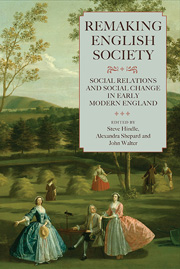Book contents
- Frontmatter
- Contents
- List of Illustrations, Figures, Maps and Tables
- Acknowledgements
- Notes on Contributors
- List of Abbreviations
- 1 The Making and Remaking of Early Modern English Social History
- 2 Brokering Fatherhood: Illegitimacy and Paternal Rights and Responsibilities in Early Modern England
- 3 Gender, Sexuality and the Consumption of Musical Culture in Eighteenth-Century London
- 4 Where was Mrs Turner? Governance and Gender in an Eighteenth-Century Village
- 5 Local Arithmetic: Information Cultures in Early Modern England
- 6 Intoxicants and the Early Modern City
- 7 Food, Drink and Social Distinction in Early Modern England
- 8 Written Obligations, Litigation and Neighbourliness, 1580–1680
- 9 Witchcraft and Neighbourliness in Early Modern England
- 10 Deference, Paternalism and Popular Memory in Early Modern England
- 11 Work, Reward and Labour Discipline in Late Seventeenth-Century England
- 12 Living in Poverty in Eighteenth-Century Terling
- 13 From Commonwealth to Public Opulence: The Redefinition of Wealth and Government in Early Modern Britain
- Appendix: Bibliography of the Published Writings of keith Wrightson from 1974 to 2011
- Index
- Tabula Gratulatoria
- STUDIES IN EARLY MODERN CULTURAL, POLITICAL AND SOCIAL HISTORY
11 - Work, Reward and Labour Discipline in Late Seventeenth-Century England
Published online by Cambridge University Press: 05 May 2013
- Frontmatter
- Contents
- List of Illustrations, Figures, Maps and Tables
- Acknowledgements
- Notes on Contributors
- List of Abbreviations
- 1 The Making and Remaking of Early Modern English Social History
- 2 Brokering Fatherhood: Illegitimacy and Paternal Rights and Responsibilities in Early Modern England
- 3 Gender, Sexuality and the Consumption of Musical Culture in Eighteenth-Century London
- 4 Where was Mrs Turner? Governance and Gender in an Eighteenth-Century Village
- 5 Local Arithmetic: Information Cultures in Early Modern England
- 6 Intoxicants and the Early Modern City
- 7 Food, Drink and Social Distinction in Early Modern England
- 8 Written Obligations, Litigation and Neighbourliness, 1580–1680
- 9 Witchcraft and Neighbourliness in Early Modern England
- 10 Deference, Paternalism and Popular Memory in Early Modern England
- 11 Work, Reward and Labour Discipline in Late Seventeenth-Century England
- 12 Living in Poverty in Eighteenth-Century Terling
- 13 From Commonwealth to Public Opulence: The Redefinition of Wealth and Government in Early Modern Britain
- Appendix: Bibliography of the Published Writings of keith Wrightson from 1974 to 2011
- Index
- Tabula Gratulatoria
- STUDIES IN EARLY MODERN CULTURAL, POLITICAL AND SOCIAL HISTORY
Summary
In June 1692, Sir Richard Newdigate of Arbury near Nuneaton (Warwick-shire) condemned the indolence of one of the agricultural labourers who was employed on his estate. William Suffolk, he noted, ‘lyes abed and will not work’. Complaints of this kind were entirely characteristic of an economic context in which, for the first time in well over a century, the fortunes of employers, and especially of landlords, were being undermined by falling rents, stagnant prices and increasing wages. Because labour was in relatively short supply in late seventeenth-century England, it was believed that ‘the very fabric of society could be threatened, not just by rising wages and costs, but by a swelling independence among the working masses, which commonly manifested itself in a refusal to engage wholeheartedly in unremitting toil’. There was, accordingly, a growing consensus, emerging among the propertied elite in the century after 1650, about the ‘utility of poverty’. Employers, magistrates and political economists alike agreed both in print and in the administration of social policy that ‘the higher the wages labourers and artisans received, the less they worked, and that, while low wages bred industry and diligence, high wages bred laziness, disorderliness and debauchery’. This, then, was a particularly troubling time in the long history of labour relations and it presented particular challenges to employers who sought not only to recruit, retain and discipline the labour force but also to incentivise productivity among their employees.
- Type
- Chapter
- Information
- Remaking English SocietySocial Relations and Social Change in Early Modern England, pp. 255 - 280Publisher: Boydell & BrewerPrint publication year: 2013



